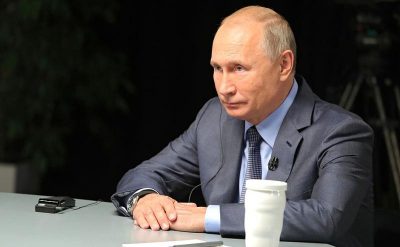20 Years of Vladimir Putin: His Top Domestic and Foreign Policy Successes

Vladimir Putin assumed office as Russia’s Acting President 20 years ago on 31 December, 1999, after which he speedily proceeded to transform both his country and the rest of the world in the two decades since.
President Putin became his country’s acting leader 20 years ago on 31 December, 1999, prior to being formally elected to the presidency a few months later in March 2000. He was initially praised as a Western darling because of the false presumption that he’d follow in his predecessor’s footsteps by allowing foreign-allied oligarchs to continue ruling the country in parallel with accepting the diktats of Russia’s former Old Cold War-era rivals. Putin certainly surprised them by breaking with their expectations and speedily proceeding to transform Russia and the rest of the world in the two decades since. As such, the most remarkable achievements of his career deserve to be highlighted on the twentieth anniversary of his leadership. Here’s a brief list of his main domestic and foreign policy successes during his time in office in one capacity or another:
Tamed The Traitorous Oligarchs
Putin immediately caught flak from the West for bringing the law to bear upon corrupt foreign-allied oligarchs who posed a latest threat to national security and sovereignty, but after making high-profile examples out of a few, the rest soon gave up their political ambitions, followed the law, and continued operating their businesses.
Stabilized Chaotic Chechnya
The foreign-backed terrorist-separatist insurgency in Chechnya was a festering wound that threatened to fatally infect the rest of Russia with time if not properly dealt with, but Putin oversaw a second much more successful federal intervention there that ultimately resulted in a pragmatic peace arrangement that still holds to this day.
Paid Off Foreign Debt & Amassed Enormous Reserves
Another reason why the West began to detest Putin was because he freed Russia from its debt bondage and then amassed enormous reserves as a result of responsible fiscal spending and record-high oil prices during the 2000s, which strengthened its economy to the point of surviving the Great Recession mostly unscathed.
Defended Russian Peacekeepers From Georgian Aggression
Although only Prime Minister at the time, few doubt that Putin played a leading role in coordinating Russia’s response to the lethal aggression carried out against its peacekeepers by the Georgian military on the eve of the 2008 Olympics, which showed the world that Russia was finally ready to legally defend its foreign interests.
Presided Over Crimea’s Democratic Reunification With Russia
Putin stayed true to his patriotic roots by presiding over Crimea’s democratic reunification with Russia following the success of the Western-backed EuroMaidan urban terrorist coup that brought neo-fascist Russophobes to power in Ukraine, thus altering the course of contemporary International Relations for the better.
Established The Eurasian Economic Union (EAU)
Far from “recreating the USSR” like his foreign critics fearmongered he was trying to do, Putin’s establishment of the EAU aims to reintegrate the former Soviet Republics in a manner that respects their national sovereignty yet simultaneously pools their collective economic potential in order to make them more globally competitive.
Teamed Up With China To Change The World
The onset of the West’s anti-Russian sanctions in 2014 proved to Putin that his so-called “partners” wouldn’t accept an independent Russia into the ranks of their “New World Order”, hence why he teamed up with China in order to jointly facilitate the emergence of the Multipolar World Order instead.
Destroyed Daesh In Syria
The Russian Aerospace Forces played a pivotal role alongside their on-the-ground Syrian, Iranian, and Hezbollah allies in destroying Daesh ever since the commencement of their anti-terrorist intervention in the Arab Republic in late 2015, thus making the world a much safer place for everyone.
Masterminded Russia’s “Balancing” Strategy
Despite being snubbed by the West, Putin isn’t by any means “anti-Western” (though some of his most zealous foreign supporters will never believe it), which explains why he masterminded Russia’s “balancing” strategy of pursuing a “New Detente” with the West in parallel with joining China’s Belt & Road Initiative (BRI).
Diplomatically Returned To Afghanistan
Few could have predicted at the beginning of his first presidency that his fourth one would see Russia diplomatically returning to Afghanistan by hosting the Taliban, the spiritual successors of the 1980s Mujaheddin, in Moscow for peace talks several times throughout the past year.
Developed Hypersonic Superweapons
Putin guaranteed Russia’s security for years to come by developing hypersonic superweapons that have yet to be built by anyone else, which enabled his military to neutralize the US’ so-called “missile defense shield” and thus uphold the principle of “Mutually Assured Destruction” that’s thus far a nuclear war.
Committed To The “National Development Projects”/”Great Society”
With an eye on the future, Putin committed to the $400 billion socio-economic modernization of his country in order to ensure that it’s able to properly meet future challenges, remain competitive, and sufficiently integrate itself into changing global economy.
Pioneered The Greater Eurasian Partnership (GEP)
With its security needs and socio-economic development assured per the aforementioned two achievements, Putin knew that the next natural step would be to position Russia as the centerpiece of the emerging Multipolar World Order through the GEP that he pioneered for integrating the supercontinent with time.
*
Note to readers: please click the share buttons above or below. Forward this article to your email lists. Crosspost on your blog site, internet forums. etc.
This article was originally published on OneWorld.
Andrew Korybko is an American Moscow-based political analyst specializing in the relationship between the US strategy in Afro-Eurasia, China’s One Belt One Road global vision of New Silk Road connectivity, and Hybrid Warfare. He is a frequent contributor to Global Research.

